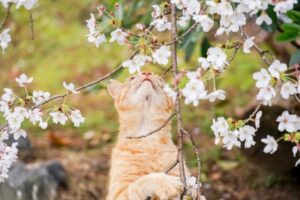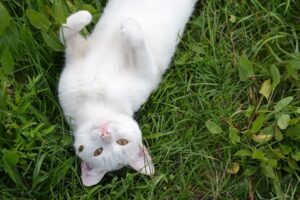Enjoy Every Season with Your Cat! Introducing Cat Care for Each Season

Spring, summer, autumn, and winter – the beautiful changes of the four seasons are a charm of Japan.
However, for delicate cats, the seasonal changes can affect their health and cause stress. Whether it's a hot or cold day, we want cats to feel comfortable. This time, we will explain cat care for each season.
Table of Contents
1. Spring Cat Care
∟ 1-1. Health issues due to temperature differences
∟ 1-2. Shedding season
∟ 1-3. Estrus period
∟ 1-4. Changes in lifestyle
2. Summer Cat Care
∟ 2-1. Fleas and ticks
∟ 2-2. Food poisoning
∟ 2-3. Heatstroke
3. Autumn Cat Care
∟ 3-1. Dryness
∟ 3-2. Overeating
∟ 3-3. Vaccinations
4. Winter Cat Care
∟ 4-1. Cold weather
∟ 4-2. Urological diseases
∟ 4-3. Accidents with heating devices
Conclusion
1. Spring Cat Care

As spring warms up and flowers begin to bloom, it's a cheerful season. However, both humans and cats are susceptible to health issues and stress due to significant changes in temperature and lifestyle. Additionally, cats undergo major physical changes such as shedding and estrus during this time, so proper care is essential.
1-1. Health issues due to temperature differences
Spring is a season with large temperature variations, going from warm to suddenly cold.
Not only diseases like cat colds but also "spring stress," where the cat's autonomic nervous system balance is disrupted, leading to increased blood pressure, heart rate, and dizziness, should be watched for.
Check the weather forecast regularly and adjust the room temperature accordingly. Also, having two beds for spring and winter, allowing the cat to choose freely based on temperature and health, is crucial.
1-2. Shedding season
Shedding season begins around March, and cats start to lose fur. If left unattended, the cat may groom itself, swallowing fur and leading to "trichobezoars" in the stomach. This can cause symptoms such as vomiting, constipation, loss of appetite, and even serious issues like intestinal obstruction or choking, so it's essential to be cautious.
Frequent brushing to remove loose fur can prevent trichobezoars. Providing hairball care food or cat grass is also beneficial.
1-3. Estrus period
From February to April, with the lengthening of days, female cats experience their peak estrus period. They may vocalize loudly, urinate in unusual places, and owners might find these behaviors challenging.
Male cats also react to the scent and pheromones of females in heat, exhibiting spraying or aggressive behaviors. Both males and females may attempt to escape in search of a mate, requiring caution.
If breeding is not planned, spaying or neutering can eliminate estrus behavior. However, if considering breeding, consult with a veterinarian, pet shop, or breeder to carefully plan mating partners and timing.
1-4. Changes in lifestyle
Spring is a period of change for humans. Cats can keenly sense various changes in their owner's life, such as moving, job changes, or relocation. If the cat appears stressed, providing affection, treats, or favorite snacks can help alleviate stress.
2. Summer Cat Care

Summer in Japan can be quite hot and humid. Cats are particularly vulnerable to heat, and precautions need to be taken to prevent heat-related issues.
2-1. Fleas and ticks
Summer is the season when fleas and ticks are most active. These pests can cause skin problems and transmit diseases, so it's crucial to take preventive measures.
Regularly check the cat's fur for signs of fleas or ticks. Use appropriate anti-flea and tick products recommended by veterinarians.
2-2. Food poisoning
Hot weather can lead to food spoilage. Cats are sensitive to changes in food quality, and spoiled food can cause food poisoning.
Ensure that the cat's food is stored properly, and check for any signs of spoilage before feeding. Avoid feeding the cat raw or undercooked meat during summer to prevent bacterial contamination.
2-3. Heatstroke
Heatstroke is a severe concern during the summer months. Cats dissipate heat primarily through panting, and if the surrounding temperature is too high, heatstroke can occur.
Provide a cool and shaded area for the cat to rest. Avoid leaving the cat in a hot car, and make sure there is always access to fresh water. In case of suspected heatstroke, seek immediate veterinary attention.
3. Autumn Cat Care
Autumn is a season known for dry weather and falling leaves. While it may be a comfortable season for cats, certain precautions are necessary.
3-1. Dryness
The decrease in humidity during autumn can lead to dry skin for cats. This may cause itching and discomfort.
Ensure proper hydration by providing sufficient water. Additionally, consider using a humidifier to maintain an optimal level of humidity in the indoor environment.
3-2. Overeating
As the weather cools down, cats may become more sedentary. This can lead to weight gain if food intake is not adjusted accordingly.
Monitor the cat's weight and adjust the portion size of meals as needed. Provide opportunities for indoor play to ensure regular exercise.
3-3. Vaccinations
Autumn is a suitable time for regular vaccinations. Consult with a veterinarian to ensure that the cat's vaccinations are up-to-date.
4. Winter Cat Care
Winter brings cold temperatures, and special attention is needed to keep cats warm and healthy.
4-1. Cold weather
Cats can be sensitive to cold weather, and prolonged exposure can lead to hypothermia. Provide warm bedding and ensure that the indoor environment is well-insulated.
Check for signs of cold stress, such as shivering, and take measures to keep the cat warm.
4-2. Urological diseases
Cold weather can contribute to the development of urological diseases in cats. Ensure access to fresh water, and monitor for any changes in urination behavior.
Consult with a veterinarian if there are concerns about urological health.
4-3. Accidents with heating devices
During winter, cats may seek warmth near heating devices, which can pose a risk of burns or other accidents.
Ensure that heating devices are pet-safe and monitor the cat's behavior around them. Provide alternative warm spaces for the cat to avoid potential accidents.
Conclusion
Each season comes with its own challenges for cat care. By being attentive to your cat's needs and making necessary adjustments, you can ensure that your feline friend stays happy and healthy throughout the year.


